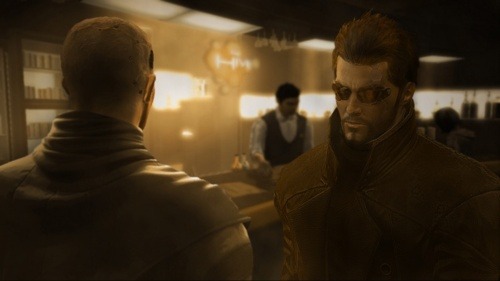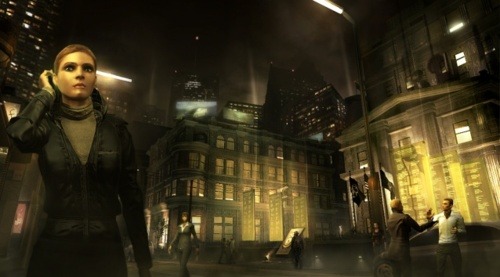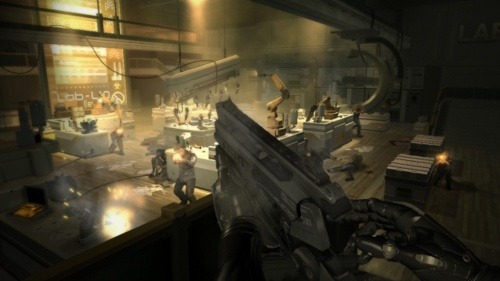Too Stuck in the Past

Adam Jensen talks to a dude.
Deus Ex: Human Revolution from Eidos Montreal and Square Enix feels like a game out of time. Its cyberpunk aesthetic and storyline as well as its level design and some of its mechanics feel ripped out of a game that was made in the era of the original Deus Ex. Back in the heady days of 2000 when films like The Matrix were still blowing everybody’s minds, you could get away with a gruff protagonist wearing a trenchcoat and sunglasses, but it looks very out of place in the media of this day and age, as does much of Human Revolution’sploddingly slow stealth gameplay. This aging design mixed with many of the facets of modern games makes for a game unlike any out there right now, which is what initially drew me to the game. Unfortunately, Human Revolutionwas a game I really wanted to love, but only managed to like.
A lot of modern games use the near future setting, but I can’t think of many that pull it off as well as Human Revolution does. Buildings, equipment and character models have sleek mechanical lines and features but are rooted enough in modern design as to be believable for the time period. The color palette of prominent black and gold and hexagonal motif in the menus and game world are a refreshing change from the drab or blue-dominated color palettes of a lot of current games. While the graphics look decent from a technical standpoint, many of the environments, particularly the mission areas, seem rather generic and uninspired.

2027 Detroit, incredibly, has even more issues than its 2012 counterpart.
If the look of some of these levels leaves something to be desired, though, it is more than made up for by the sheer amount of design work that went into them. There are games with multiple paths and then there are Deus Ex games where there are literally dozens of options. Strangely, though, the plethora of choice the designers put into the levels more often than not broke my immersion and reminded me that I was playing a video game. It’s easy to see the multiple paths that the designers put in to accommodate every possible build of Jensen. Here’s the place where you could have lifted this heavy object and gotten to your objective, here’s where you could have fallen from a great height, here’s where you could have hacked a terminal, etc. This might not be a problem for some, but it was very noticeable to me.
The gameplay itself, though is maybe the biggest problem I have with this game. It reminds me a bit of a first-person Splinter Cell. I’m not talking about the recent Conviction either, I mean 2002’s Tom Clancy’s Splinter Cell. For all the options this game presents you with, it would be disingenuous to label it anything other than a stealth-action game. Playing it as a shooter is very difficult, particularly on higher difficulty settings because the game punishes you for going loud with more guards and, later on, hard-to-kill robots and turrets. Jensen also can’t take a lot of bullets before going down, and ammunition is weirdly scarce.
This would be fine if the stealth gameplay were better, but the guard patterns are relentlessly fixed, hiding bodies is tedious, performing a quiet takedown takes a full bar of the energy you use for most of your upgrades, and getting briefly spotted leads to a one to two minute period of basically mandatory inaction as you wait for the guards to forget about you. Maybe some people still have the patience for this old style of stealth gameplay, but to me there is nothing fun or engaging about waiting to learn the guard patterns, waiting for the right minute to perform a takedown, getting briefly spotted, and then doing literally nothing for two minutes to avoid an alarm. Instead of this, I ended up using a mix of quiet and loud tactics as well as cheesing the game. At one point in the game, Jensen is caught in an ambush. How did I solve this problem? I sat in a vent where the guards couldn’t shoot me, they all bunched up around the vent where they last saw me, and I slowly picked them all off by shooting their legs or throwing frag mines at them. At various other points in the game, if you have a silenced weapon, it is possible to shoot a guard in the head, have another guard see the dead guard, shoot him in the head, and so forth until seven or eight guys have done the exact same thing. There can be some charm in figuring out how to exploit a game’s mechanics, but these issues simply should not exist in a modern game.

The only thing worse than a turret is a robot.
One of the brighter, and more modern, spots in the game is the upgrade system. Instead of putting points into attributes, the game uses a perk-like system in which each upgrade point you spend has a tangible benefit which is clearly explained before you spend the point. Some upgrades are still more useful than others, but there is good variety among them and few which seem utterly useless. You can’t get all the upgrades on one playthrough either, and all the way up until the end of the game there were still upgrades I wanted to try. It’s a minor gripe, but I also ran into a problem in which I would buy an upgrade because it would have really come in handy in a situation I just encountered, and then I rarely found another situation in which it came in handy.
One place in which upgrades really come in handy is in the game’s hacking minigame. This minigame plays like a miniature strategy game where you are capturing key nodes before a system’s tracer can discover your location. If you’re shrewd, you can also capture data stores which give you anything from credits and experience to items which make the minigame easier. It can get quite challenging and never stops being fun to the point where I would hack terminals I had the code for just to play the minigame and get some experience.
The game’s inventory system, on the other hand, has its highs and lows. It utilizes a grid-based system, like a Resident Evil game, with different weapons and items taking up different sizes of the inventory. You don’t have to play inventory Tetris if you don’t want to though, because the game features a good auto-sort. The fact that the game counts both guns and ammo as physical objects, coupled with the aforementioned scarcity of ammo, further hamstrings the ability of players to play the game as a shooter. I felt the need to spend upgrade points on the inventory, rather than a potentially more interesting system, because if I found ammo for a gun, I might need to use it.

If you see a screen like this, things have gone all kinds of bad.
Which brings us to the worst part of the game: the boss fights. Square Enix outsourced these to GRIP Entertainment and they are brutally bad. Built the perfect stealth character to cruise through the entire rest of the game? Too bad. These are straight, toe-to-toe fights where you have no idea if you are doing any real meaningful damage and the game gives you no concept of the tactics you should use. Even after knocking the difficulty down to easy, on one particular fight, I died upwards of twenty times because I had no idea what tactics I should use and the game didn’t let me know. Luckily, like most of the rest of the gameplay, the bossfights can be cheesed with mines or typhoon ammo. It makes you wonder what the game might have been like if Eidos had had the opportunity to make its own boss fights.
From the preceeding paragraphs, it might sound like Human Revolution isn’t worth your time. But the game’s saving grace is in its character interaction and story. Human Revolution’s conversations are well-written, like many of its characters. Unlike many games, the conversations also have a great deal of consequence to them affecting the outcome of missions and changing the story. It can be a bit frustrating when you’re sure you’ve picked the right course of action in a conversation and the game denies you, but I rarely felt cheated.

Don’t mess up when you talk to this guy.
It’s too bad that all of these great elements are couched in some of the most inconsistent voice acting I have heard in a game recently. Adam Jensen’s voice actor channels his best Christian Bale Batman voice throughout the game. It’s not bad, just a bit ridiculous. Other voices, like that of your boss David Sarif, are downright bad, and some of the voices are even notably racist.
Regardless of the voice acting, the story itself is good. I laughed out loud when the game’s main antagonist was revealed, but a good amount of player agency and twists and turns kept me engaged through the fifteen or so hours of this game. It’s the type of cyberpunk tale that’s rare in today’s media, reminiscent of the writings of William Gibson. The story deals with the issues of whether or not corporations or other entities should be allowed to modify humanity and the issues with income inequality that such changes would raise. It is all very thoughtful and well-done and makes me wonder why we don’t see cyberpunk tales like this very much anymore. With working brain-machine interfaces a reality and human genetic modification becoming more and more viable, the genre would seem to have a lot to say about the modern world and I’m glad to see it back in the games medium. The game has multiple endings, none of which are particularly strong or different from one another. They can all be experienced back to back with a well-placed save, which I found convenient if a bit cheap.
Ultimately, Human Revolution is a game that reaches a little bit too far back to its predecessor. It’s one thing to pay homage to a well-loved ten-year-old game. It is quite another to make a game in 2011 with systems that make it feel like a ten-year-old game. That being said, if you enjoy or even can get past the deeply flawed stealth-heavy gameplay, Deus Ex: Human Revolution is absolutely a game you should try. Even after nearly twelve years, there’s no game like Deus Ex. Here’s to hoping Eidos can produce a sequel that addresses many of the issues this game has and truly brings Deus Ex into the modern era.
